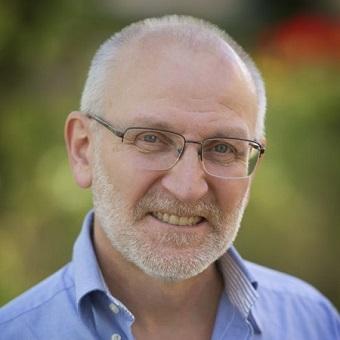Soil may not be top of mind — but this precious resource that lies beneath our feet is fundamental to our lives. It produces virtually all of the food we eat. It filters our water. It’s home to a quarter of all living species. Yet, climate change continues to have a catastrophic impact on its health. Every five seconds, the equivalent of one soccer field of soil is eroded. And by 2050, it’s estimated that a staggering 90 per cent of the Earth’s topsoil could be degraded.
Soil may not be top of mind — but this precious resource that lies beneath our feet is fundamental to our lives. It produces virtually all of the food we eat. It filters our water. It’s home to a quarter of all living species. Yet, climate change continues to have a catastrophic impact on its health. Every five seconds, the equivalent of one soccer field of soil is eroded. And by 2050, it’s estimated that a staggering 90 per cent of the Earth’s topsoil could be degraded.
It’s a reality that Dr. Richard Heck understands all too well, as he’s spent the past two decades studying soil as a professor in the School of Environmental Sciences at the University of Guelph. “As a society, we have to be concerned about this resource and the huge number of ecosystems it serves,” he says.
In a quest to bring these issues to the forefront, Richard has led the charge to host one of the most prestigious soil conferences in Canada: The World Congress of Soil Science. After being approached with the idea by the Leaders Circle — Toronto’s conference ambassador program — he worked as representative of the Canadian Society of Soil Science, with Destination Toronto and the Metro Toronto Convention Centre to win the bid to host the 24th annual conference in Toronto. Taking place in July of 2030, over half a century since it was last held in Canada, the conference will focus on the theme of “Soils in a Warmer World.”

Dr. Richard Heck, Post-Secondary Educator, Environmental Sciences Researcher, Professional Agrologist (OIA), University of Guelph
A natural draw
Toronto has long been a leading host destination for internationally renowned business events — and for good reason. Canada’s largest city boasts enriching cultural activities, diverse culinary offerings, state-of-the-art conference facilities and an array of accommodations. While no doubt key to an event’s success, those attributes alone are no longer enough to drive attendance.
The reason? Two-plus years of a pandemic coupled with rising costs and lower budgets have meant that delegates have become increasingly selective in the events they attend in person. Today, decisions revolve around the connections they will make, the innovations they will be among the first to see, the knowledge they will gain, and the potential for novel ideas to be sparked. In other words: attendees are carefully assessing whether the host destination has the knowledge capital to make the journey worthwhile.
"Toronto is a meeting destination like no other in the world. Not only does it have excellent congress infrastructure and conveniently located conference facilities, it’s also a strong hub of world-class innovation in several sectors, including life sciences, technology and finance," says Kathy Nicolay, Leaders Circle Manager. "Conference organizers witness the benefit of attendees collaborating and sharing knowledge on technical tours and more."
As Richard adds, that was a major factor that contributed to Toronto’s success in bidding for the 24th World Congress of Soil Science: “We had to demonstrate to the voting delegates that we had an interesting theme, and the event as a whole will be rewarding,” he explains. “So, we put a lot of thought into those dimensions, asking ourselves questions like ‘What kind of experience beyond sitting in rooms and listening to technical papers will this provide”?
Ripe with possibilities
In a world-leading agribusiness hub like Toronto, those possibilities are many.
The region’s strong connection and linkages to agricultural production will play an invaluable role in delivering enriching experiences. Delegates will have the chance to meet with some of the brightest minds who are working tirelessly to shape the future of food production. They will see cutting-edge soil innovations during technical tours of organizations. The conference will harness the region’s acclaimed research and educational institutes, including the University of Guelph — a major agrifood research innovation hub.
The World Congress of Soil Science won’t be limited to the city of Toronto, either. The surrounding regions are home to some of the most fertile agricultural lands and innovative food producers in the country. That’s why one day has been designated for giving attendees the chance to see this first-hand. Delegates will be able to participate in local in-congress tours of the Niagara region, to gain a deeper understanding of how soil impacts fruit and wine production; Holland Marsh, a unique organic vegetable-producing area located an hour of Toronto; and much more.
“Within a couple hours’ drive radiating out from Toronto, we can provide plenty of opportunities for people to understand the issues of landscape and soil — and how changing climatic conditions are having an impact on that,” Richard adds.
Unique learning opportunities will also be offered before and after the conference. Prior to it, there will be an international soil judging contest, technical workshops and webinars, and tours highlighting regional research and agricultural development efforts, such as in northern Ontario’s Great Clay Belt. Leveraging Toronto’s role as a gateway to the rest of Canada, post-congress tours will be organized by regional committees across the country, allowing attendees to examine the natural and managed ecosystems of Canada’s West Coast, Prairies, North, Quebec, and East Coast.
A powerful legacy
When reflecting on what he hopes attendees to think after the conference, Richard hopes that they’ll leave feeling inspired and grateful that they made the trip.
“What we have control over is creating a rewarding experience,” he says. “This conference is a once in a four-year opportunity, and some people only go a few times at most in their lives. It’s not a trivial decision for attendees to make. So, if they can walk away and say that they are glad they didn’t miss this one, then we’ve done our job.”
As for the Canadian soil sciences industry, Richard firmly believes that raising awareness of the importance of soil among the general public will have a multitude of ripple effects — from inspiring the next generation to pursue careers in the industry to increasing support for critical research that has the potential to save the planet.
“As much as possible, we want to be able to raise public awareness of soils and use this opportunity specifically to do that,” he says.
A natural draw
Toronto has long been a leading host destination for internationally renowned business events — and for good reason. Canada’s largest city boasts enriching cultural activities, diverse culinary offerings, state-of-the-art conference facilities and an array of accommodations. While no doubt key to an event’s success, those attributes alone are no longer enough to drive attendance.
The reason? Two-plus years of a pandemic coupled with rising costs and lower budgets have meant that delegates have become increasingly selective in the events they attend in person. Today, decisions revolve around the connections they will make, the innovations they will be among the first to see, the knowledge they will gain, and the potential for novel ideas to be sparked. In other words: attendees are carefully assessing whether the host destination has the knowledge capital to make the journey worthwhile.
"Toronto is a meeting destination like no other in the world. Not only does it have excellent congress infrastructure and conveniently located conference facilities, it’s also a strong hub of world-class innovation in several sectors, including life sciences, technology and finance," says Kathy Nicolay, Leaders Circle Manager. "Conference organizers witness the benefit of attendees collaborating and sharing knowledge on technical tours and more."
As Richard adds, that was a major factor that contributed to Toronto’s success in bidding for the 24th World Congress of Soil Science: “We had to demonstrate to the voting delegates that we had an interesting theme, and the event as a whole will be rewarding,” he explains. “So, we put a lot of thought into those dimensions, asking ourselves questions like ‘What kind of experience beyond sitting in rooms and listening to technical papers will this provide”?
Ripe with possibilities
In a world-leading agribusiness hub like Toronto, those possibilities are many.
The region’s strong connection and linkages to agricultural production will play an invaluable role in delivering enriching experiences. Delegates will have the chance to meet with some of the brightest minds who are working tirelessly to shape the future of food production. They will see cutting-edge soil innovations during technical tours of organizations. The conference will harness the region’s acclaimed research and educational institutes, including the University of Guelph — a major agrifood research innovation hub.
The World Congress of Soil Science won’t be limited to the city of Toronto, either. The surrounding regions are home to some of the most fertile agricultural lands and innovative food producers in the country. That’s why one day has been designated for giving attendees the chance to see this first-hand. Delegates will be able to participate in local in-congress tours of the Niagara region, to gain a deeper understanding of how soil impacts fruit and wine production; Holland Marsh, a unique organic vegetable-producing area located an hour of Toronto; and much more.
“Within a couple hours’ drive radiating out from Toronto, we can provide plenty of opportunities for people to understand the issues of landscape and soil — and how changing climatic conditions are having an impact on that,” Richard adds.
Unique learning opportunities will also be offered before and after the conference. Prior to it, there will be an international soil judging contest, technical workshops and webinars, and tours highlighting regional research and agricultural development efforts, such as in northern Ontario’s Great Clay Belt. Leveraging Toronto’s role as a gateway to the rest of Canada, post-congress tours will be organized by regional committees across the country, allowing attendees to examine the natural and managed ecosystems of Canada’s West Coast, Prairies, North, Quebec, and East Coast.
A powerful legacy
When reflecting on what he hopes attendees to think after the conference, Richard hopes that they’ll leave feeling inspired and grateful that they made the trip.
“What we have control over is creating a rewarding experience,” he says. “This conference is a once in a four-year opportunity, and some people only go a few times at most in their lives. It’s not a trivial decision for attendees to make. So, if they can walk away and say that they are glad they didn’t miss this one, then we’ve done our job.”
As for the Canadian soil sciences industry, Richard firmly believes that raising awareness of the importance of soil among the general public will have a multitude of ripple effects — from inspiring the next generation to pursue careers in the industry to increasing support for critical research that has the potential to save the planet.
“As much as possible, we want to be able to raise public awareness of soils and use this opportunity specifically to do that,” he says.
The Canadian Visionaries Network
Meet the Canadians, like Richard Heck, whose innovation and sector leadership are attracting international business events to Canada.
